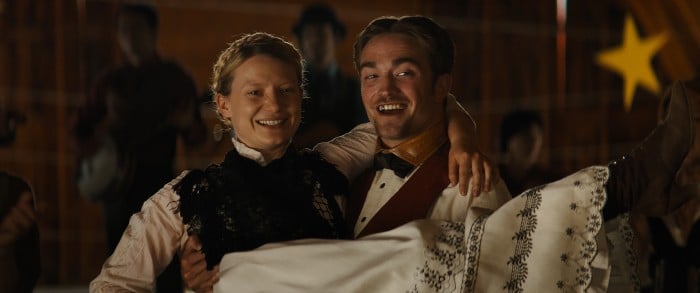Third-day coverage of the 68th Berlin International Film Festival with a review of Damsel, directed by David & Nathan Zellner
Damsel
The Zellner brothers, David and Nathan, establish the tone of Damsel right away with a prologue that finds an old preacher and a drunkard in the middle of the American wilderness waiting for a stagecoach. The preacher (Robert Forster, priceless), whose face is an expressive map of creases, is going East, while the drunkard (David Zellner) is heading West. This kind of scene has been used in plenty of Westerns before (with extreme long shots exploring the vastness of the land), but the catch here is that Damsel is not really a Western in the strict sense of the genre, rather a slapstick satire where even the preacher admits he had to use pages of his Bible for cigarette and hygiene.
The West is a lawless, horrid place, and so the old man, tired of catechizing savages and waiting forever for a stagecoach that never comes, strips off his clothes and walks away into the desert, crazy as a loon. As the drunkard keeps the man’s Bible and goes West to become “Parson Henry,” we begin to follow pioneer Samuel Alabaster (Robert Pattinson), a hopeless romantic who sets off into the Old West with a miniature horse called Butterscotch and a guitar on his back to get Parson Henry to marry him to the love of his life, Penelope (Mia Wasikowska). But after they part to meet her, Samuel informs the parson this is also a rescue mission — which turns out to be only the first of many crazy revelations in their way.
Embracing a slapstick humor quite unusual for a Western unless you are Terrence Hill and Bud Spencer, Damsel deconstructs genre conventions and offers a cynical view of the Old West with moments that range from cartoonish (when a camera tilts down to reveal what happened to a man who was running) to absurd (the loony rescue) and even surreal (like a hilarious discussion between three characters in a forest in the third act). In fact, the film reaches the point of nonsensical with lines such as “I’m not the posse type” and a character with an arrow buried in his back.
Although this is not an easy type of film to make work, part of the success of Damsel lies in its tonal balance (and I love how a burial scene goes so fast from tragic to comic in a second), part due to its performances. Robert Pattinson keeps showing us he has become a fantastic actor and embodies the kind of dandy (fake tooth included) that makes us laugh out loud as he sings about his “honeybun” and masturbates looking at a photo of Penelope. And if David Zellner is very funny investing in a usually confused expression, Joseph Billingiere is hilarious as a disgusted Indian who completely steals the show in the brief time he appears.
Even so, the star is Mia Wasikowska, playing a tough damsel not so in distress who is not moved by cheap adulations and knows how to use a shotgun better than any of these men. What makes this film so clever is the way it uses classic sexist tropes (a man wanting to save a damsel, every single male character trying to win her over by telling her she is beautiful, and so on) to make it clear how stupid they are. Lines such as “Why are you doing this to me?” or “You gave me mixed signals” make us laugh because we recognize they are what you would expect to hear from a lot of “romantic” men.
A mocking of this outdated concept of romanticism could only work in a film that throws away the whole idea of a noble Hollywood hero living in an antiseptic Western. What we see here is dirt, flies, rascals, and death. Things look more realistic than in a classic Western, even if the cinematography is also stunning and the production design makes it all look like a trip back in time to real saloons and gunfights. This is fun for a revisionist Western parody, and Damsel even uses the sounds of flies at a certain moment to emphasize how repellent those times were.
Stumbling only occasionally with jokes that are maybe too goofy to work (like an Indian trying to cut down a tree with a hatchet) and twists that are too absurd even for a film like this (when a character who is supposed to be dead shows up alive), Damsel has a cynical ending that makes total sense as it shows that romance is a waste in a wild place where you should take what you want and head away before everything is taken from you.





